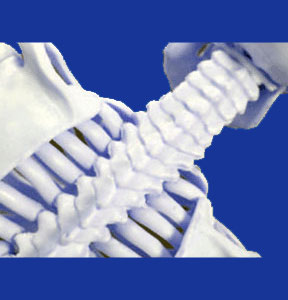
Cervical disc desiccation is normal to experience as a person ages, yet can be accelerated by many factors, including traumatic injury, genetic programming and idiopathic contributors. Disc desiccation simply means that the structure of the disc shrinks, due to a loss of hydration over time or suddenly. Intervertebral discs are made up mostly of water, as is the majority of our body. The interior of each disc is composed of a moisture-rich core, surrounded by a tough fibrous outer shell. This interior nucleus is the part of the disc which desiccates; not only losing water, but also the ability to rehydrate daily.
This article clearly describes disc degeneration in the cervical spine and provides patients, whose pain may have been blamed on intervertebral aging, with some sensible facts.
Cervical Disc Desiccation Defined
Desiccation means drying out. This process occurs in many areas of our anatomies, but is particularly easy to visualize in the intervertebral discs. Beginning in early adulthood, these disc spacers begin to change in their characteristics, based on deterioration which alters their ability to perform. Normally, discs hydrate overnight while our bodies are at rest. As we stand each day and impose stress on our spines, the discs lose water. Therefore, it is obvious why humans are slightly taller when they get out of bed, compared to when they return to sleep at night. Over time, this ability to rehydrate decreases and some amount of hydration is permanently lost. This is what we call desiccation.
Some opportunistic doctors have named this natural and inherently innocent process degenerative disc disease, but this is a gross misnomer. It is not a disease, and in fact, it is not truly degenerative. What we have is an organic tissue which shrinks over time in response to complete normal life stresses. Since the spine accounts for a good portion of our height, this also explains why people get shorter as they get older. It is this loss of hydration and the slow decrease in overall length of the spine which answers this common patient question.
Disc Desiccation Symptoms
Unto itself, desiccation is harmless. It is not painful, nor even noticeable to a person. Science has shown that disc desiccation is not a definitive cause of neck pain. However, desiccation is also not completely innocent. Intervertebral degeneration is a known contributor to an escalation of the osteoarthritic processes. It is also a known cause of herniated discs. It should be no surprise that these are the 2 most common reasons cited for chronic neck pain, although these conclusions are not always accurate.
Some arthritis and disc prolapse can indeed by problematic, when neurological tissues are compressed. However, the vast majority of cervical herniated disc and cervical osteoarthritic processes are innocent of causing any significant or lasting symptoms at all. This is a fact supported by indisputable research and only argued by those same opportunistic doctors who have become rich treating mostly innocent scapegoat abnormalities in the backbone for decades. Therefore, it is safe to assume that normal desiccation in the neck should not be deemed responsible for causing pain, unless it can be definitively and objectively linked to the mechanical process inducing the expression.
Cervical Disc Desiccation Advisory
In my decades of active involvement in back and neck pain patient advocacy, I have only met a few people, out of literally hundreds of thousands, whose pain was not suspected of being related to the degeneration of the intervertebral discs by at least one doctor or chiropractor. This is because disc degeneration is truly universal and if it was not in existence in an adult with, or without, neck pain, this person would be an anomaly. It is crucial to know that disc degeneration exists whether pain is present or not, and in fact, the degree of degeneration is not related to the chances of a person suffering any neck pain. This is shocking when you consider that mild desiccation is often cited as the sole explanation for unbelievably severe pain, while other people, with literally no disc material left, have no pain at all.
Our advice is to do your own research and fully understand the normality of disc desiccation before putting any blame on it or wasting any time or money pursuing what may just amount to needless treatment. After all, wouldn’t it be better to actually identify and treat the real cause of pain?
Neck Pain > Degenerative Disc Disease Neck Pain > Cervical Disc Desiccation





